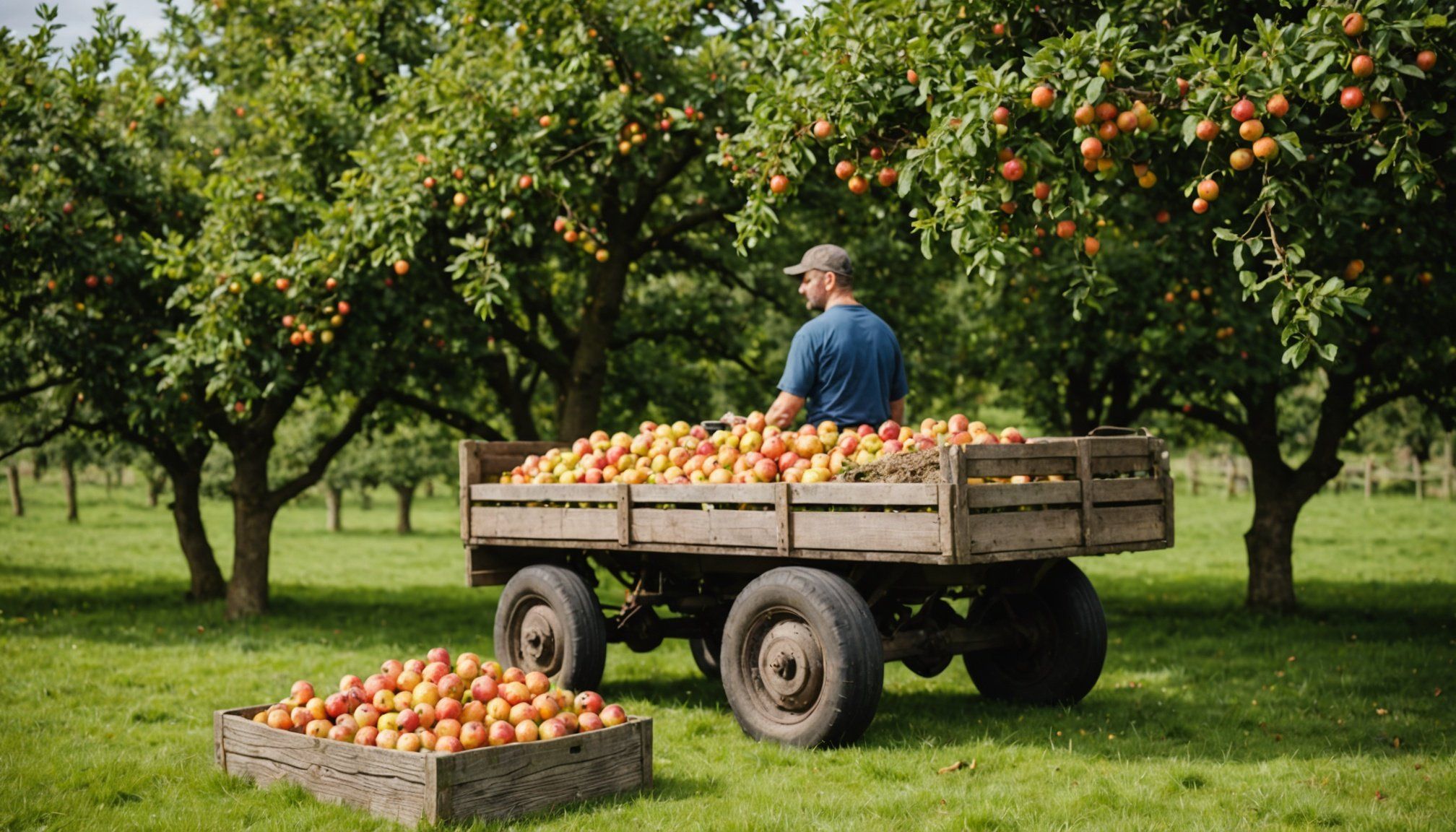Overview of Somerset’s Cider Crafting Traditions
Somerset, England, is renowned for its rich cider heritage, with a history deeply intertwined with its agricultural past. The inception of cider production in Somerset dates back centuries, playing a pivotal role in defining the region’s cultural and social tapestry. Historically, cider was not just a beverage but a staple in the daily lives of the locals, often serving as both sustenance and reward for farm labourers.
The cultural significance of Somerset cider is notable, influencing festivals and local music, and often acting as a social lubricant in gatherings. It fostered a sense of community as villagers would come together for cider-related activities, strengthening social bonds. Cider was a common element during cultural traditions, providing families and neighbours with opportunities to connect.
This might interest you : Discover Glasgow’s Top Venues for an Authentic Scottish Ceilidh Dance Adventure
Over the years, the traditional craft of cider making in Somerset has become a expression of English heritage, mirroring traditional English values of craftsmanship, quality, and sustainability. The methods reflect an appreciation for locally sourced ingredients and seasonal rhythms, maintaining a tradition passed down through generations. Somerset cider continues to be a symbol of regional pride and identity, celebrating the county’s rich historical narrative and its enduring relevance in English culture.
Traditional Cider Brewing Techniques
In Somerset, the traditional methods of cider making hold a revered place, celebrated for their authenticity and dedication to craftsmanship. These techniques have evolved over centuries, yet they remain rooted in core practices ensuring genuine authentic cider production.
In the same genre : Explore Genuine British Pottery Studios: A Tourist’s Guide to Experiencing Traditional Craftsmanship
A cornerstone of these methods is the careful selection of apples. Somerset’s unique climate produces a variety of apple strains, each contributing distinct qualities to the cider’s flavour. Varieties include bittersweet and sharp apples, which are meticulously blended for balance. The cider making techniques start with harvesting mature apples, typically in autumn, followed by pressing them to extract juice.
The fermentation process occurs naturally, relying on wild yeast found on apple skins. This practice upholds the authentic taste distinctive to Somerset ciders. Traditional oak barrels are often used, imparting additional flavours to the cider. Over time, modern equipment and practices have been introduced to standardise production, yet many artisan producers favour these traditional methods to retain authenticity.
As influencers of authentic cider production, these time-honoured techniques reflect Somerset’s rich cider history, weaving together the past and present. Despite technological advancements, the blend of tradition with evolution embodies the enduring cider heritage in the region, sustaining its cultural and social significance.
Profile of Local Cider Makers
In Somerset, the thriving community of local cideries reflects the distinctive essence and artisanal spirit of the region. Unique in their approaches and philosophies, these local cider makers each bring an individual flair to cider crafting, deeply rooted in Somerset’s cider history. The passion and dedication of these artisan cider producers are evident in the intricate flavours and the authenticity of their products.
Notable Cideries in Somerset
Several prominent cideries showcase the best of Somerset’s cider tradition. Cideries like Sheppy’s and Thatchers have created a legacy with their dedication to quality and innovative flavours. Each establishment prides itself on using traditional techniques alongside modern adaptations.
Profiles of Renowned Cider Makers
Renowned cider makers such as Julian Temperley and Richard Johnson embody the dedication and artistry of Somerset’s cider culture. Their personal stories reveal a deep connection to local cider heritage, reflecting generations of craftsmanship.
Unique Offerings from Local Producers
Every producer offers unique creations, from single-varietal ciders highlighting Somerset’s apple diversity to blends featuring innovative ingredients. Seasonal ciders and limited editions allow artisans to showcase their creativity, providing something special for the community and cider enthusiasts alike.
Immersive Experiences in Somerset
Exploring cider tours in Somerset provides an unparalleled cultural immersion into the region’s storied cider legacy. These tours offer a personalised glimpse into the processes that go into cider crafting, steeped in tradition and local expertise. Visitors can engage directly with Somerset cider makers, gaining insights into the meticulous art of blending apple varieties that shape the county’s renowned ciders.
During tasting experiences, you can expect a journey through a spectrum of flavours, from tangy, refreshing ciders to deep, robust ones. These events are often paired with stories from the artisan cider producers, who passionately share the history and heritage of their craft. It’s an opportunity to taste unique cider creations and limited editions, often unavailable outside the locale, offering a special touch to the experience.
To capture the full cultural immersion, consider participating in cider-making workshops or festivals, which are abundant in Somerset. These activities dive deeper into the craftsmanship and offer hands-on learning experiences. For an authentic visit, plan your cider tours during harvest season, when the orchards are vibrant, and the cider making techniques are in full swing, providing an enriching connection to Somerset’s enduring cider culture.
The Importance of Cider in Local Economies
The cider industry has a profound impact on Somerset’s economy, contributing significantly to both local and regional economic landscapes. Cider production not only supports sustainable agriculture by employing local workers in orchards and cideries but also boosts allied businesses such as tourism and hospitality. This vibrant sector ensures a robust support system, intertwining with various facets of the community.
Economic benefits extend through cider festivals and events that attract thousands of visitors annually, showcasing local businesses and fostering community engagement. These events create tremendous revenue opportunities for small enterprises, from local food vendors to craft artisans, enhancing the region’s commercial vitality. They help enhance Somerset’s visibility as a cider hub and cultural destination, further reinforcing its economic relevance.
Community involvement is integral to the cider industry’s success, with local producers often collaborating on initiatives to support sustainable practices and promote their craft. The dedication to preserving cider heritage ensures a continued connection between generations, reflecting the industry’s cherished place in regional identity.
By intertwining economic contribution with cultural significance, Somerset’s cider industry plays a pivotal role in sustaining and enriching local life, underscoring its importance beyond mere production. This ensures that cider remains a cherished element of Somerset’s unique heritage and economy.
Cider’s Influence in English Heritage
The rich cider legacy in Somerset is deeply interwoven with English history and traditions, embodying a significant aspect of English heritage. Cider crafting in this region dates back centuries, becoming a symbol of cultural and historical identity. As communities revere these customs, they celebrate not just an agricultural product but a piece of their past.
Cider holds a crucial role in numerous historical celebrations and rituals throughout England. During festivals, the drink acts as a binding element, enhancing the festive spirit and bringing people together. Traditionally, it was also offered during key life events such as weddings, symbolising prosperity and bringing good fortune to families.
Moreover, the iconography of cider in Somerset reflects a profound connection to regional identity. The acts of making and sharing cider are viewed as a communal activity, embodying service to community and fostering social interaction. This tradition remains a proud testament to the region’s ongoing dedication to preserving its cultural heritage.
In these ways, cider does more than the mere act of quenching thirst; it conveys a deep-rooted appreciation of history, tradition, and local identity. Each sip is a nod to England’s storied past and the enduring spirit of its people.










